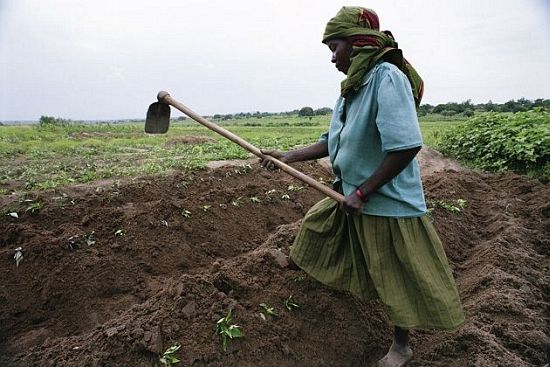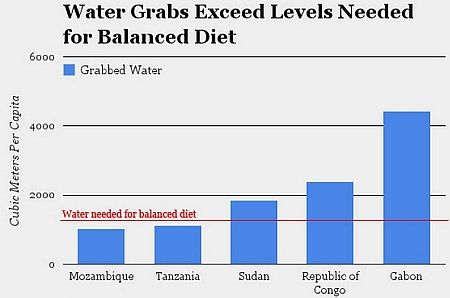Welcome to DU!
The truly grassroots left-of-center political community where regular people, not algorithms, drive the discussions and set the standards.
Join the community:
Create a free account
Support DU (and get rid of ads!):
Become a Star Member
Latest Breaking News
Editorials & Other Articles
General Discussion
The DU Lounge
All Forums
Issue Forums
Culture Forums
Alliance Forums
Region Forums
Support Forums
Help & Search
Monbiot: Corporate Carve-Up
Last edited Mon Feb 2, 2015, 01:02 PM - Edit history (2)
June 10, 2013
Under the pretext of preventing hunger, the rich nations are engineering a new scramble for Africa.
By George Monbiot, published in the Guardian 11th June 2013
That African farming needs investment and support is indisputable. But does it need land grabbing? Yes, according to the deals these countries have signed. Mozambique, where local farmers have already been evicted from large tracts of land, is now obliged to write new laws promoting what its agreement calls “partnerships” of this kind(6). Cote d’Ivoire must “facilitate access to land for smallholder farmers and
private enterprises”(7). Which, in practice, means evicting smallholder farmers for the benefit of private enterprises. Already French, Algerian, Swiss and Singaporean companies have lined up deals across 600,000 hectares or more of this country’s prime arable land. These deals, according to the development group GRAIN, “will displace tens of thousands of peasant rice farmers and destroy the livelihoods of thousands of small traders.”(8) Ethiopia, where land grabbing has been accompanied by appalling human rights abuses, must assist “agriculture investors (domestic and foreign; small, medium and larger enterprises) to … secure access to land”(9).
And how about seed grabbing? Yes, that too is essential to the well-being of Africa’s people. Mozambique is now obliged to “systematically cease distribution of free and unimproved seeds”, while drawing up new laws granting intellectual property rights in seeds which will “promote private sector investment”(10). Similar regulations must also be approved in Ghana, Tanzania and Cote d’Ivoire.
private enterprises”(7). Which, in practice, means evicting smallholder farmers for the benefit of private enterprises. Already French, Algerian, Swiss and Singaporean companies have lined up deals across 600,000 hectares or more of this country’s prime arable land. These deals, according to the development group GRAIN, “will displace tens of thousands of peasant rice farmers and destroy the livelihoods of thousands of small traders.”(8) Ethiopia, where land grabbing has been accompanied by appalling human rights abuses, must assist “agriculture investors (domestic and foreign; small, medium and larger enterprises) to … secure access to land”(9).
And how about seed grabbing? Yes, that too is essential to the well-being of Africa’s people. Mozambique is now obliged to “systematically cease distribution of free and unimproved seeds”, while drawing up new laws granting intellectual property rights in seeds which will “promote private sector investment”(10). Similar regulations must also be approved in Ghana, Tanzania and Cote d’Ivoire.
Strangely missing from the New Alliance agreements is any commitment on the part of the G8 nations to change their own domestic policies. These could have included farm subsidies in Europe and the US, which undermine the markets for African produce, or biofuel quotas, which promote world hunger by turning food into fuel. Any constraints on the behaviour of corporate investors in Africa (such as the Committee on World Food Security’s guidelines on land tenure(12)) remain voluntary, while the constraints on their host nations become compulsory. As in 1884, the powerful nations make the rules and the weak ones abide by them. For their own good, of course.
The West, as usual, is able to find leaders in Africa who have more in common with the global elite than they do with their own people. In some of the countries which have joined the New Alliance, there were wide-ranging consultations on land and farming, whose results have been now ignored in the agreements with the G8. The deals between African governments and private companies were facilitated by the World Economic Forum, and took place behind closed doors(13).
The West, as usual, is able to find leaders in Africa who have more in common with the global elite than they do with their own people. In some of the countries which have joined the New Alliance, there were wide-ranging consultations on land and farming, whose results have been now ignored in the agreements with the G8. The deals between African governments and private companies were facilitated by the World Economic Forum, and took place behind closed doors(13).
Full Article: http://www.monbiot.com/2013/06/10/corporate-carve-up/
Are African Land Grabs Really Water Grabs?
By Jennifer C Franco and Lyla Mehta and Gert Jan Veldwisch
Source: CNN Wednesday, March 27, 2013
(CNN) -- Millions of hectares of land have been acquired in the past few years across Africa by investors who are moving into large-scale agriculture to take advantage of potential windfall gains. Popularly these deals have become known as "land grabbing," but they could just as well have been framed as "water grabs."
All around the world powerful actors (transnational as well as national) are pointing out that the lands in which they invest are "marginal" and "unproductive" lands. This has been shown to be untrue for many cases; either the land is already used by small-scale food producers, or is of prime quality and associated with good (potential) access to water.
Full Article: https://zcomm.org/znetarticle/are-african-land-grabs-really-water-grabs-by-jennifer-c-franco/
http://www.cnn.com/2012/07/05/business/op-ed-africa-land-grab/index.html
Abstract
Global Land And Water Grabbing
http://www.pnas.org/content/early/2013/01/02/1213163110.abstract
[IMG] [/IMG]
[/IMG]
In 2010, a former Wall Street trader flew into war-torn Sudan to negotiate a deal with a thuggish general. He had his eye on a 1 million acre tract of fertile land fed by a tributary of the Nile in the southern section of the country, a region that later claimed its independence as South Sudan. The investor, who planned to profit by developing and exporting agricultural commodities, boasted about how the region's instability was a principal variable in his financial model: "This is Africa," he told reporter McKenzie Funk, who shadowed him for a riveting piece in Rolling Stone (PDF). "The whole place is like one big mafia. I'm like a mafia head."
Over the last decade (and especially during the last four years) wealthy nations have increasingly brokered deals for huge swathes of agricultural land at bargain prices in developing countries, installed industrial-scale farms, and exported the resulting bounty for profit. According to the anti-hunger group Oxfam International, more than 60 percent of these "land grabs" occur in regions with serious hunger problems. Two-thirds of the investors plan to ship all the commodities they produce out of the country to the global market. And droughts, spikes in food and oil prices, and a growing global population have only made the quest for arable land more urgent, and the investments that much more alluring.
[IMG] [/IMG]
[/IMG]
Global Land And Water Grabbing
http://www.pnas.org/content/early/2013/01/02/1213163110.abstract
[IMG]
 [/IMG]
[/IMG]
In 2010, a former Wall Street trader flew into war-torn Sudan to negotiate a deal with a thuggish general. He had his eye on a 1 million acre tract of fertile land fed by a tributary of the Nile in the southern section of the country, a region that later claimed its independence as South Sudan. The investor, who planned to profit by developing and exporting agricultural commodities, boasted about how the region's instability was a principal variable in his financial model: "This is Africa," he told reporter McKenzie Funk, who shadowed him for a riveting piece in Rolling Stone (PDF). "The whole place is like one big mafia. I'm like a mafia head."
Over the last decade (and especially during the last four years) wealthy nations have increasingly brokered deals for huge swathes of agricultural land at bargain prices in developing countries, installed industrial-scale farms, and exported the resulting bounty for profit. According to the anti-hunger group Oxfam International, more than 60 percent of these "land grabs" occur in regions with serious hunger problems. Two-thirds of the investors plan to ship all the commodities they produce out of the country to the global market. And droughts, spikes in food and oil prices, and a growing global population have only made the quest for arable land more urgent, and the investments that much more alluring.
[IMG]
 [/IMG]
[/IMG]
Data within the PNAS report also indicate that the "mafia head" approach of targeting vulnerable countries for investments is not just the strategy of a lone land-grabbing cowboy, but standard practice. It's easier to wrest land and displace small-scale farmers in countries with a weak rule of law, according to Oxfam. In many cases, the land is developed to export crops or commodities for biofuels, and in other cases, left to sit idle so it can increase in value before it's sold.
Of the countries that lost the highest percentages of their cultivated land, nine out of 10 have malnourishment rates of 5 percent or more (see chart below). And according to Foreign Policy and Fund for Peace's Failed States Index, all the states in the graph below, with the exception of Uruguay, are categorized as unstable.
Of the countries that lost the highest percentages of their cultivated land, nine out of 10 have malnourishment rates of 5 percent or more (see chart below). And according to Foreign Policy and Fund for Peace's Failed States Index, all the states in the graph below, with the exception of Uruguay, are categorized as unstable.
The Real Invasion Of Africa Is Not News, And A Licence To Lie Is Hollywood’s Gift
By John Pilger
Source: johnpilger.com
Wednesday, January 30, 2013
http://johnpilger.com/articles/the-real-invasion-of-africa-is-not-news-and-a-licence-to-lie-is-hollywoods-gift
By John Pilger
Source: johnpilger.com
Wednesday, January 30, 2013
http://johnpilger.com/articles/the-real-invasion-of-africa-is-not-news-and-a-licence-to-lie-is-hollywoods-gift
1 replies
 = new reply since forum marked as read
Highlight:
NoneDon't highlight anything
5 newestHighlight 5 most recent replies
= new reply since forum marked as read
Highlight:
NoneDon't highlight anything
5 newestHighlight 5 most recent replies
Monbiot: Corporate Carve-Up (Original Post)
polly7
Jul 2013
OP
dixiegrrrrl
(60,154 posts)1. An excellent post on a very important issue...
rec.